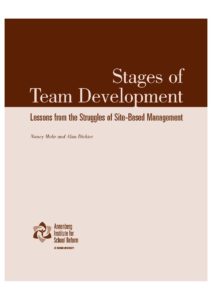Stages of Team Development: Lessons from the Struggles of Site-Based Management
Excerpt
We saw for ourselves the tremendous power that can be generated within a school when the professional staff genuinely experiences a sense of ownership. But we learned that adult empowerment, for its own sake, is too limited a goal. We found that adult ownership, while necessary, does not in and of itself make learning more powerful for students. We learned how to get beyond ownership as a goal and how to develop professional communities of learners, focused on teaching and learning, that are able to take advantage of the multiple perspectives a community can offer….
The most fundamental conclusion we have drawn is that learning to share decision making in a professional community that focuses on student learning is a developmental process, and each stage of that process offers discrete challenges and opportunities. When teachers form teams in their classrooms, the student groups will go through these stages. When superintendents work with principals, or their own staff, the same lessons apply. Just as it is useful to remember that our children will and must go through the terrible twos, it’s comforting to remember that even our adult communities will and must go through stages in their development and will have to work through some fairly predictable problems in order to emerge in a more mature state.
We now fully appreciate that the driving question underlying this journey is not “When does shared decision making work and when does it not work?” but rather “What do you have to do to develop a professional community to the point where it is promoting rigor in teaching and learning throughout a school?” We also know that leadership is essential to the successful negotiating of this journey. And we don’t mean only principal leadership; teachers, parents, students, and district administrators must all play essential leadership roles.
Also Recommended
See allLeaning Toward Light: A Conversation with Tess Taylor
This episode of NWP Radio features a conversation with Tess Taylor, an avid gardener, the author of five acclaimed collections of poetry, and the editor of Leaning Toward Light: Poems for Gardens and the Hands that Tend Them.


